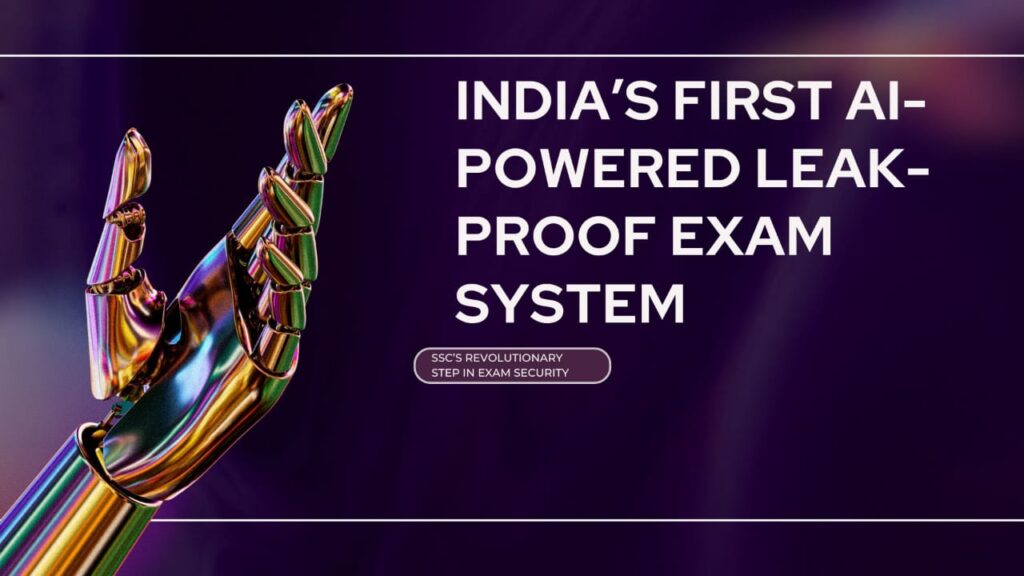
AI: – India’s First AI-Powered Leak-Proof Exam System: SSC’s Revolutionary Step in Exam Security
Discover how SSC has adopted India’s first AI-driven leak-proof exam technology developed by Cubastion Consulting. Learn how it works, its real-time question selection mechanism, security layers, and future applications in UPSC, Railways, and more.
What Is AI and Why Is It Trending?
Artificial Intelligence (AI) is no longer just a buzzword—it’s evolving rapidly. From creating king-like versions of your selfies to solving mathematical problems, AI is transforming how we interact with machines. But did you know AI is now being used to secure government exams? It is good initiative to curb the paper leak problem and brings the integrity of the exam. You feel happy to know that the first exam of AI was held on June15,2025. It is a historic moment just not for SSC but the entire exams in India, added “SSC Chairman” S Gopalakrishnan.
In a significant step, the Staff Selection Commission (SSC) has deployed an AI-powered exam system that promises to eliminate paper leaks and exam malpractice. This article explores how AI works in exams, its current capabilities, and what it means for the future of competitive tests in India.
What Is Artificial Intelligence? Explained for Beginners
AI is a branch of computer science designed to simulate human intelligence. It performs tasks like:
- Learning
- Problem-solving
- Decision-making
- Pattern recognition
- Language understanding
AI tools like Gemini AI, ChatGPT, and Groq learn from user input. They evolve continuously—learning from feedback, fixing mistakes, and becoming more reliable over time.
Example:
A user asked Gemini AI: “Which number is greater: 9.9 or 9.1?”
The tool initially answered incorrectly, but after feedback, it corrected itself. This adaptability is what makes AI so powerful.
SSC’s Game-Changing Move: AI in Exams
SSC has become the first government body in India to implement an AI-based leak-proof exam system. The goal?
✔ Prevent paper leaks
✔ Ensure real-time, secure, and fair examinations
Key Features of the AI-Driven Exam System:
| Feature | Description |
| Real-Time Question Generation | Questions are selected dynamically just before the exam. |
| Zero Trust Security Model | No system or user is trusted by default—everything must be verified. |
| Dynamic QR Code-Based Authentication | Candidate ID is verified through encrypted QR code scanning. |
| End-to-End Encryption | Each question paper is digitally signed and decrypted only at the exam venue. |
Qubecion Consulting: The Technology Provider
Qubecion Consulting, a leading tech service provider, developed this AI system. The tool doesn’t create questions but selects questions from a massive pre-approved question bank, ensuring:
- No duplication
- No repetition
- Topic-wise balanced distribution
Example:
AI is instructed:
“Create a paper with 1 trigonometry, 2 geometry, 4 percentage, and 1 profit-loss question.”
It selects appropriate questions, avoiding repeats from previous shifts.
Why Is This a Landmark Step?
Security Benefits:
- No human can tamper with the paper.
- Questions are revealed only 15 minutes before the exam.
- Different sets for different candidates without compromising difficulty levels.
Scalability:
This AI system can be scaled across:
- UPSC
- Railways
- State PSCs
- Departmental exams
First Use Case:
The first test using this technology was conducted on 15 June 2025 during a departmental exam.
Will AI Replace Human Question Setters?
No. Human educators will continue to create and approve questions. AI will only select and structure them in real time. This reduces human bias and error while ensuring fairness and difficulty parity.
The Role of AI:
| Task | AI’s Role |
| Question creation | ❌ No |
| Question approval | ❌ No |
| Question selection | ✅ Yes |
| Paper structuring | ✅ Yes |
Common Concerns and Misconceptions
Will each student get a unique paper?
Yes, based on the question bank’s diversity. Papers will be different but of equal difficulty.
What if the AI makes a mistake?
The system uses real-time feedback to learn and adapt. AI tools like Gemini and ChatGPT have shown such learning capabilities in public use.
External References and Resources
Future Outlook: Will CGL and Railway Exams Use This?
Not immediately. While departmental exams have begun using AI systems, major exams like SSC CGL and Railway RRB will take time. Once the AI system proves its consistency and accuracy, it will likely expand to mass-scale exams.
Expected Timeline:
| Exam | AI Implementation |
| SSC CGL | 🚫 Not in 2025 |
| RRB Exams | ❌ Not in 2025 |
| Departmental Exams | ✅ Started in June 2025 |
| Broader Rollout | 🔜 Within 2 years |
Final Words
The adoption of AI in Indian competitive exams marks a transformational shift. From real-time question selection to zero-trust security, SSC’s initiative has opened a new chapter in transparent, tamper-proof, and scalable exam delivery. The main aim of AI is to release result accurate, faster and secure.
Stay prepared, stay informed—and remember:
AI can generate your paper, but only your hard work can help you solve it.
FAQs
Q1. Is the AI selecting or creating questions in SSC exams?
AI is selecting questions from a pre-approved bank, not creating them.
Q2. Which was the first exam to use AI tech in India?
A departmental exam conducted by SSC on 15 June 2025.
Q3. Can AI generate unique papers for each candidate?
Yes, as long as the question bank is diverse and well-structured.
Q4. Is this AI-based system coming to SSC CGL or Railways in 2025?
Not yet. Large-scale adoption will require time and testing.
Q5. What is Zero Trust Technology?
It’s a security model where no user/system is trusted by default—every access request must be verified.
If you found this article useful and helpful, please share it and follow our updates on mydailymails.in.





